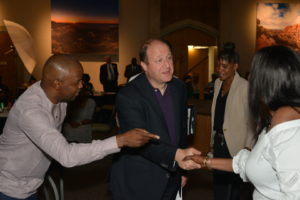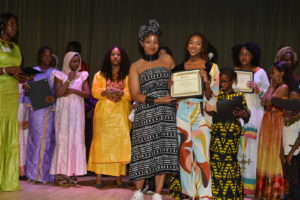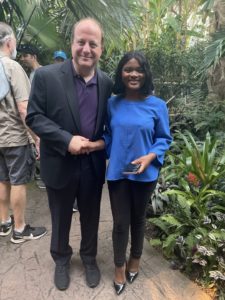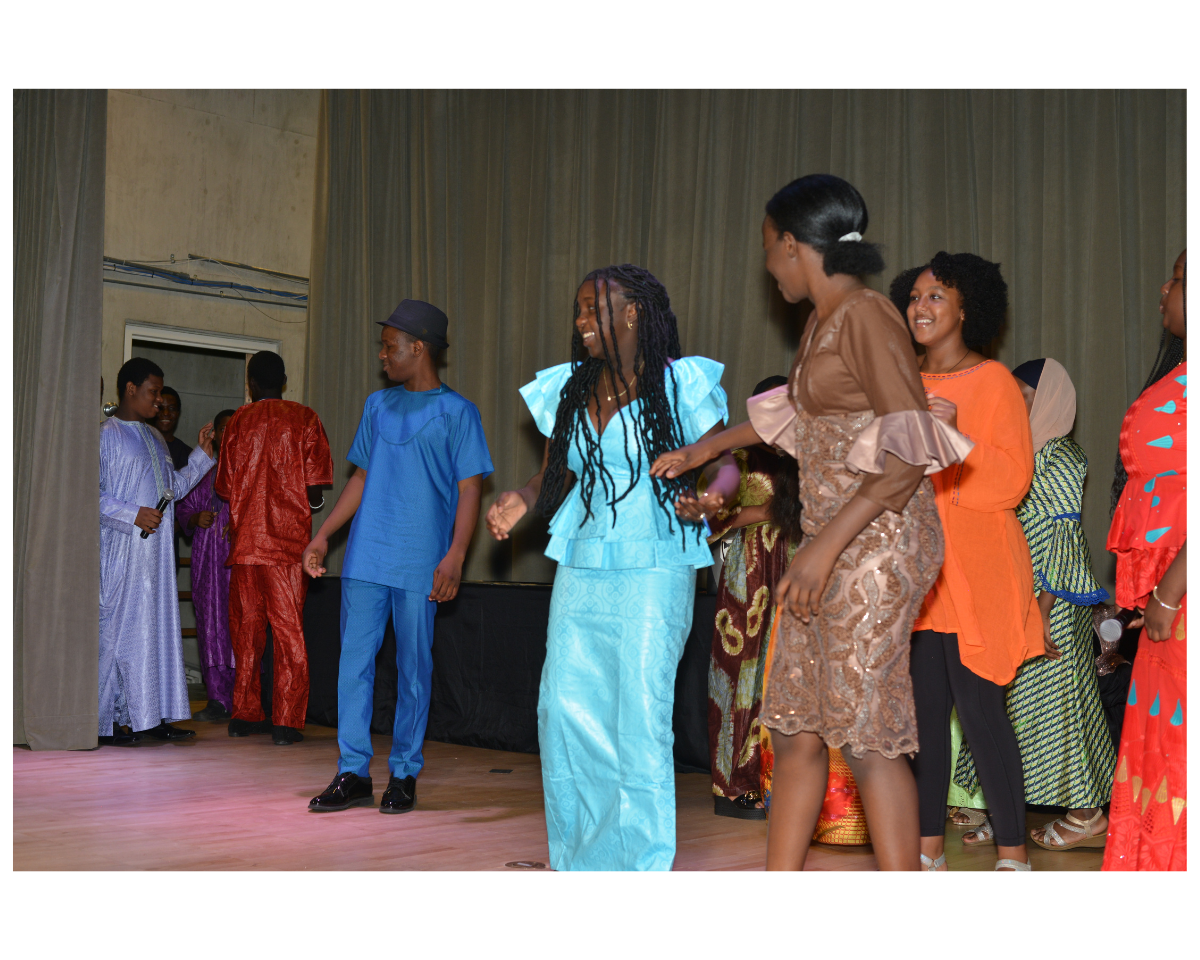The African Leadership Group’s 2022 Afrik Impact Celebration kicked off July 29 with an exuberant Youth Empowerment celebration at the Denver Botanic Gardens, with the theme of “Growing up African in America.”
The event featured a dance performance, fashion show, poetry recital, a debate on immigration and assimilation, an awards presentation, and an original play, all led by ALG’s active and energetic young members. The event concluded with a lot of joyous dancing.
Attendees included youth, their parents, and a number of elected officials and other dignitaries.
 Colorado Governor Jared Polis attended the celebration, and offered some remarks to the assembled crowd. Gov. Polis stressed that young ALG members have the potential to become leaders and the community and have a seat at the table, but that to do so requires persistent dedication to schoolwork.
Colorado Governor Jared Polis attended the celebration, and offered some remarks to the assembled crowd. Gov. Polis stressed that young ALG members have the potential to become leaders and the community and have a seat at the table, but that to do so requires persistent dedication to schoolwork.
He also said that ALG’s Youth Empowerment members should never feel invisible, but instead should find the tools within themselves to insist on being heard. “You all are brilliant and we encourage you to read more. You can be professors, doctors, lawyers… whatever you aspire to be!” Polis said.
One highlight of the evening, among many, was the presentation of leadership awards to six outstanding ALG youth. The awardees were:
- Leadership award: Maimouna Seydi, a junior at KIPP Northeast Denver Leadership Academy
- Leadership award: Silvana Gebremariam, a sixth-grader at Prairie Middle School
- Academic achievement award: Mariem Dia, a junior at Colorado Early College

- Academic achievement award: Mariam Camara, a junior at Denver East High School
- Extra Mile award: Snidaos Gebremariam, a sophomore at George Washington High School
- Extra Mile award: Caleb Melaku, a fifth-grader at Aurora Quest K-8 School
Another highlight was a moving keynote address by Lumiere (Sidonie) Bukasa. Here is the full text of her address:
Navigating My Africanness and Americanness Identity
Being African, far from your home, seems like a raging war, a turbulence none can comprehend “Sometimes it’s hard to know where I fit it. I’m at this gray line, where I’m not African enough, and I’m not American enough. I question my Africanness at times. Saying, I’m not truly an African because I wasn’t born there or I grew up here in the US. Only memory I hold is a fading flicker of light that I can see at the end of my tunnel.
“My son, we are all the same, we bleed the same blood, my great, great, great, great grandfather could have been the man who might have started your legacy here, so you see the interconnectedness of our identity is something we must celebrate, the layers of identity that Africa and America bestowed upon you. You are African, not because you were born in Africa, you are African because Africa was born in you.”Kwame Nkrumah.
 Today I would like to speak on the topic of Growing Up African in America and the complexities of identity, and I think this is such an intrinsic topic with layers of unique stories waiting to be told. Each one of us has a story. And my own ties in with the Navigation of Africanness and the unique identity.
Today I would like to speak on the topic of Growing Up African in America and the complexities of identity, and I think this is such an intrinsic topic with layers of unique stories waiting to be told. Each one of us has a story. And my own ties in with the Navigation of Africanness and the unique identity.
When we tell the African story in the diaspora, at times it’s fragmented. Where there is a truth there, a lie here. Oftentimes the story of Africans growing up in America is a story of complexity and is a story that one must take a look at because of how profound it is. One thing I love about Africans is we love stories. We love to tell stories that connect us all to our roots. We listen to stories of ancient history, present glories and future mysteries. And this is another one thread of story to add onto what we already have.
When me and my family arrived on this soil promised to us our hearts were filled with glee, our lips sang chants that rose up to God as burnt offering, we ascended in the realm of praise, souls dancing, feet tapping itself in the tapestries of America’s design. The first time we saw snow, it’s as if we witnessed the tears of God. If God could cry, his tears would snow, we were convinced. We went out, unable to control our smiles, we would dance in the snow without jackets on. Until we realized we were about to freeze to death. The longer we lived here, my father opened the envelope sold to him of American dreams, only to realize it was America’s toil. And from then, the experiences, values and hopes of being an African in America began to mold us.
It seems unquestionable that, as human beings, we all have a sense of attachment or affiliation to various identities that precedes the action we take and the beliefs we carry. When I started school in the US, that’s when I realized my skin color was different, my hair held the kinkiest curls and my accent protruded when I said certain words. It was the first time I would be made fun of for being too black, the only black. I would be called an African booty scratcher, and when I would bring my native food to school, that foreign scent would make others turn away. I felt out of place. Here I was, coming from a country where having this food or this Africanness was the norm, but here it was strange.
So I felt like a stranger. When I would wear my African Clothes, You know especially on fancy school occasions, the whole room would look at you as if you’ve gone mad. Their eyes would vividly ask you “what are you wearing” without their lips ever uttering a word. So I stopped wearing my cultural attires, until my 3rd year of high school.
I was solicited to abandon my culture, disregard my accent, live in the shadow of others, while they paraded the pride of their culture. I remember walking into classes, head tilted low, because I was called the African booty scratcher. My peers would ask if I lived in huts when I was in Congo, rode on lions and ate from the jungle. To think of it as an older woman now, Having a lion for a pet is pretty cool. And living huts doesn’t necessarily mean poverty, it’s just a matter of perception.. So for a long time, I started to deny my Africanness. My peers would ask, You’re from Africa right? To which I would answer No, because I wanted to distance myself from any Africanness. “Well you look and sound like you came from Africa” they would reply. Even though I tried to sever my connection to my identity, I still carried the remnants of it that everywhere I went, I would be pointed out as African. From the way I would dance to the drum to the way I would switch from English to swahili when I wanted to gossip about that one girl in class.
So for the longest time I struggled to maintain and sustain the pride of my Africanness in the vast pool of cultures and identities . It wasn’t cool to be African here back in the day. Being an African was an invite for bullying and scolding. People would bond over their ridicule of Africans.
As an African, as a first generation or even second, you begin to realize that your Africanness is the soil for other identities to take root. That your Africanness, blackness can live hand in hand with the exposure of Americanness.
Growing up in America has definitely shown me that the power to define and redefine my identity lies within my hand. That I know my blackness is my imprint, and my Africanness is my DNA. DNA cannot be falsified, but DNA is your coding, makeup despite whether you acknowledge it or not. I began to realize that Africa was in me as my spiritual makeup, and America’s experiences and values began to take root in this Africanness. I used to deny myself of the influence of Americanness, the intersectionality of my Africanness to my American identity. But being in America, one cannot deny the unique multi-layered identity that you gain as part of the American tapestry.
As humans, the experiences we have coils and altered our makeup. From the moment I stepped foot in America, the experiences of what a minority, black and African person would experience became my unsolicited friend. The American experience beguiled me. But I think a lot of Africans then begin to struggle with the idea of I am enough of an African with this American influence, am I less American. Especially those that practically grew up here. I think that’s the beauty of being an African growing up in America. Our identity goes beyond the perimeters of Africa, transcends borders and labels to become the unique badge of honor we wear. That we are not less Africans because we are here, but rather, we are Africans because Africa is alive in us. Oftentimes, when the story of an African is recounted in America or the diaspora, it only explores a single identity of Africanness but what about the intersectionality of American experience sipping into your African soul. That your cultural tapestry is that of Africa and America. It took me until College for me to understand that yes I’m African but I also carry the experience and culture of America. And that does not mean I’ve abandoned my Africanness.
If my story were to be told years from now it would be that of not just my Africanness, but also my American history. Just with that being said, I used to refuse the influence of America’s culture in my africanness. Even though I would dance to Davido on Friday, I would break dance to Hiphop, and get in my feelings with the Weekend on saturday. The beauty of it all is that, growing up in America as an African has built a person of great courage and stamina. That even when I endure the racism that comes from Americanness, I can still claim the strength of my Africanness.


